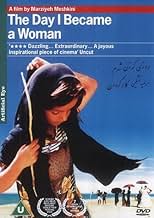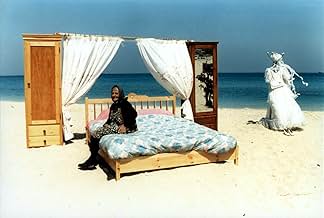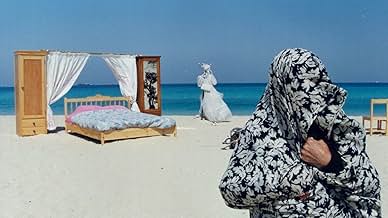Roozi ke zan shodam
- 2000
- 1h 18min
CALIFICACIÓN DE IMDb
7.3/10
2.1 k
TU CALIFICACIÓN
Tres historias conectadas muestran mujeres en momentos decisivos: el cumpleaños 9 de una niña, una carrera ciclista y el sueño de una anciana de comprar lo anhelado.Tres historias conectadas muestran mujeres en momentos decisivos: el cumpleaños 9 de una niña, una carrera ciclista y el sueño de una anciana de comprar lo anhelado.Tres historias conectadas muestran mujeres en momentos decisivos: el cumpleaños 9 de una niña, una carrera ciclista y el sueño de una anciana de comprar lo anhelado.
- Dirección
- Guionistas
- Elenco
- Premios
- 10 premios ganados y 5 nominaciones en total
- Dirección
- Guionistas
- Todo el elenco y el equipo
- Producción, taquilla y más en IMDbPro
Opiniones destacadas
It was, in some ways, a strange film. Its' use of symbolism, combined with the mystery of incomplete plots gave it a unique look, and oddly made the film better than it probably is. There are folks who won't care much for this film, but I found it a charming and poignant look at the status of women in Islamic nations. How tradition is clashing with changing times.
I liked the first segment best, because of it's sweet sadness. I next like the third segment, because the old lady was quite charming. And though I did like the middle segment, I found it the hardest to follow and understand.
This isn't a great film, but it is a very good one. Technically it's below what I've come to expect from a film, but it conveys it's message well and does so with bittersweet sadness which works well for this film. It may be an Iranian "feminist" movie, but it's worth a look.
I liked the first segment best, because of it's sweet sadness. I next like the third segment, because the old lady was quite charming. And though I did like the middle segment, I found it the hardest to follow and understand.
This isn't a great film, but it is a very good one. Technically it's below what I've come to expect from a film, but it conveys it's message well and does so with bittersweet sadness which works well for this film. It may be an Iranian "feminist" movie, but it's worth a look.
I saw this gem of a film a few months ago and it has lived with me ever since. There are lots of great things to talk about but I will only mention a few. I liked the striking images of the sea and the shore and the manner in which they are imbued with great meaning. The sea - which represents adventure, sensuality, fluidity, freedom and sex - is a constant motif throughout the film and is a joy to look at. I also liked the structure - reminiscent of Hemingway's short stories - where characters from one story seem to reappear in others.
But though connected through theme and also through the plot, the individual films retain a great level of distinctiveness. For instance, the second film remains unresolved at the end and the discussion of the two fellow riders in the third movie only have the effect of heightening that suspense. On the other hand, the third film has the effect of satisfactorily and unexpectedly wrapping up the first film: whereas the girl in the first film was denied the chance to enjoy the sea (and everything it represents), the old woman in the third film takes her revenge by completely inverting tradition. The image of the old woman and those motifs of domesticity being carried away on the sea is unusual but also funny. In putting not only herself but also her whole house on the sea, the old woman has inverted tradition and has the ultimate revenge.
But though connected through theme and also through the plot, the individual films retain a great level of distinctiveness. For instance, the second film remains unresolved at the end and the discussion of the two fellow riders in the third movie only have the effect of heightening that suspense. On the other hand, the third film has the effect of satisfactorily and unexpectedly wrapping up the first film: whereas the girl in the first film was denied the chance to enjoy the sea (and everything it represents), the old woman in the third film takes her revenge by completely inverting tradition. The image of the old woman and those motifs of domesticity being carried away on the sea is unusual but also funny. In putting not only herself but also her whole house on the sea, the old woman has inverted tradition and has the ultimate revenge.
10jakub66
Having followed Iranian cinema for a while I didn't think I was in for a surprise but Meshkini (director) managed to blow me away with the minimalist approach to depicting the fundamental issues of Iranian society. The elegance, minimalism and eloquence of this picture manage to depict the role of a woman in Iran with painful clarity.
"Roozi khe zan shodam" is an essential and defining piece of cinema.
"Roozi khe zan shodam" is an essential and defining piece of cinema.
I saw "Roozi khe zan shodam" ("The Day I Became a Woman") a few days ago during the Memorial Day holiday. It was a good film with strong, subtle acting and quite interesting camera shots.
In a nutshell, the film is about women in contemporary Iran. It depicts compelling accounts about a girl who has just turned nine and is now therefore considered to be a woman and expected to leave childhood play behind; a woman's bicycle race and the strong objection a husband has to his wife's participation; and an elderly woman who has in earlier life deferred her desires to buy consumer goods and finally has the opportunity to realize her spending dreams.
Without having lived in or even visited Iran, I can't judge the realism of "Roozi khe zan shodam". The camera offers us an innocent, child-like eye, just observing these characters and leaving us to draw our own conclusions. I particularly enjoyed the cinematography of the mass of women cyclists, all clad in black practically head to foot, pedaling away almost entirely in silence except for the rhythmic pedaling noises; and the parallel shots focusing on the legs of the galloping horses, carrying the complaining husband and his cohorts. The pedaling wife Ahoo (Shabnam Tolui) never speaks a word, but her focused and desperate efforts indicate her quest for increased independence. I also enjoyed following the activities of 9-year-old Hava (Fatemeh Cherag Akhar).
I would see "Roozi khe zan shodam" again for its cinematography and the unique (at least for Western audiences) life experiences depicted. It's by no means Hollywood fare or even overtly feminist, but allows the viewer to settle in for a bit of (realistic or stylized?) local color and look at perspectives there of women in three different stages in their lives.
In a nutshell, the film is about women in contemporary Iran. It depicts compelling accounts about a girl who has just turned nine and is now therefore considered to be a woman and expected to leave childhood play behind; a woman's bicycle race and the strong objection a husband has to his wife's participation; and an elderly woman who has in earlier life deferred her desires to buy consumer goods and finally has the opportunity to realize her spending dreams.
Without having lived in or even visited Iran, I can't judge the realism of "Roozi khe zan shodam". The camera offers us an innocent, child-like eye, just observing these characters and leaving us to draw our own conclusions. I particularly enjoyed the cinematography of the mass of women cyclists, all clad in black practically head to foot, pedaling away almost entirely in silence except for the rhythmic pedaling noises; and the parallel shots focusing on the legs of the galloping horses, carrying the complaining husband and his cohorts. The pedaling wife Ahoo (Shabnam Tolui) never speaks a word, but her focused and desperate efforts indicate her quest for increased independence. I also enjoyed following the activities of 9-year-old Hava (Fatemeh Cherag Akhar).
I would see "Roozi khe zan shodam" again for its cinematography and the unique (at least for Western audiences) life experiences depicted. It's by no means Hollywood fare or even overtly feminist, but allows the viewer to settle in for a bit of (realistic or stylized?) local color and look at perspectives there of women in three different stages in their lives.
On the surface this film tells three simple stories, but its simplicity is deceiving. Each story tells an episode in the life of a woman but as the woman ages the stories become more and more surreal. In so doing Marzieh Meshkini is making a parallel with the life of Iranian women.
¿Sabías que…?
- TriviaMarzieh Makhmalbaf's directorial film debut.
- ErroresIn the first sequence, the lollipop that Hava and Hassan pass between them grows and shrinks in size without regard to the passage of time.
- Citas
Grandmother: Will you promise to be back by noon?
Hava: I promise!
Grandmother: God won't forgive you if you lie. Don't be late.
- ConexionesFeatured in Women Make Film: A New Road Movie Through Cinema (2018)
Selecciones populares
Inicia sesión para calificar y agrega a la lista de videos para obtener recomendaciones personalizadas
Detalles
- Fecha de lanzamiento
- País de origen
- Sitios oficiales
- Idioma
- También se conoce como
- The Day I Became a Woman
- Locaciones de filmación
- Kish Island, Irán(location)
- Productoras
- Ver más créditos de la compañía en IMDbPro
Taquilla
- Presupuesto
- USD 180,000 (estimado)
- Total en EE. UU. y Canadá
- USD 149,971
- Fin de semana de estreno en EE. UU. y Canadá
- USD 48,255
- 8 abr 2001
- Total a nivel mundial
- USD 149,971
Contribuir a esta página
Sugiere una edición o agrega el contenido que falta

Principales brechas de datos
By what name was Roozi ke zan shodam (2000) officially released in India in English?
Responda


















